Morocco - Travel Writing
High Atlas Highjinks
The Todra Gorge is a gateway to the High Atlas Mountains, Morocco, within view of a vast expanse of golden sand representing the western rim of the Sahara Desert. Two sheer cliff walls, three hundred metres high, rise out of the rocky river bed of a crystal clear stream, just ten metres apart.
In the pleasant chill of morning, before the scorching sun had touched our tent, just through the gorge itself, stomach cramps set in. Luckily I managed to get well away from our small encampment before the full effects took hold. Explosive stool syndrome is never a very pleasant start to the day.
We were obliged to retreat to the les Roches, deep within the Todra gorge, to let nature take its course and experiment with local cures in the comfort of a hotel. During a three day recovery, our hosts talked of an unusual festival that was happening two days ride away, deep within the Atlas ranges, near the mountainous mudbrick town of Imilchil. A gathering of tribal folk for the sale of animals, and the exchange of wedding vows. 160 marriages performed over three days was a spectacle not to be missed.
The road to Imilchil however is not for the fainthearted. Most participants prefer travel by camel or donkey, to the overcrowded cattle trucks which ply the route. Trucks with large open crates are packed with men, women and children, holding on amongst bulging sacks, scruffy goats and heavy fuel drums. We were travelling on our trusty 83 BMW R100, with a German couple riding two aging XT500.
Chewing grit in huge dust clouds, behind convoys of such juggernauts, we rode the treeless mountain passes, under dark blue skies. Rocks as big as your head were strewn along the gravel road and views of the golden Erg Chebbi sand dunes of the western Sahara, were occasionally visible as the road snaked and climbed higher into the mountains.
Impromptu petrol stations were set up to cater for the abnormal traffic flow. Forty-four gallon fuel drums were strategically placed along the 100km, two day drive. Moroccan attendants hand pumped fuel into large jugs or empty four litre oil containers for accurate measurements of the valuable liquid.
Berbers are North Africa's original inhabitants. They are lighter coloured than the majority Arab population with a high incidence of blondness, speaking variations of a single language. Almost 99% are Muslim, but many features of earlier pagan religions have survived. They continued to own slaves until at least the mid 70's, and still often depict creatures with magical powers in decorative designs. A woman anxious to have a child might be advised to eat a snake's head, while an impotent man might hang a jackal's gall bladder at his groin. The power of faith being cheaper than Viagra.
They live a mainly nomadic and subsistence lifestyle, herding goats and sheep. When harvests are in, they return from a seasonal summer migration to the high meadows and distant mountain villages, to bring camels and stock to barter at the annual event.
The festival occupies a central plateau between two ranges, the dry stony earth a patchwork of green where the irrigation ditches reach. The main stage is beside three huge marquee. Groups of men and women gather, twenty at a time, before taking to the illuminated stage in a night time procession of dance and chants. The men wear ceremonial ankle length cotton jalabas with heads wrapped in cloth. They sway to and fro, rhythmically beating round leather drums above their heads. Women, heads covered, twirl in formation amongst the row of chanting men. After the twenty minute spectacle, the group is replaced my another group of willing participants and the ceremony begins again, much to the delight of the clapping and cheering crowd.
Berber tribeswomen are free to divorce and remarry as often as they wish and those widowed or divorced and looking for a husband, wear decorative pointed hoods to distinguish themselves from the rounded hooded virgins ineligible for instant marriage at the Imilchil Festival. The women in peaked hoods, draped in coloured cloaks and silver jewellery depicting tribal origins to the initiated, will only ever reveal their eyes, whilst at the fair, and so the men must select future wives by the sound of her voice and the look in her eyes.
Upon selection, couples shake hands and consider themselves engaged as he declares "You have penetrated my liver". "You too" , she replies. These people believe the liver to be the source of love, and a notary takes care of the formalities.
Tourists are delegated a small area to the far east of the grounds, outside the main market area. A small group of bikers from France, Germany, Italy and New Zealand, mingled with members of an overland truck expedition, and a convoy of French 4x4 enthusiasts, the lucky few who braved the atrocious roads to attend this major event on the social calender in the Maghreb region.
The central market area is cluttered with open sided tents and blue tarpaulin covers, where merchants sell food, trinkets, essential supplies and second hand clothing. Skilled traders talk you into their stalls and bartering can be severe. At the time I was sporting a ginger goatee beard which the locals found highly amusing. Bargaining took an interesting turn when a young stall holder offered a small and embossed, silver box for its removal. Not anticipating my compliance, I secured a memorable souvenir.
Meat stalls lined a dusty path on one side of the market, selling freshly killed and gutted goats. Goats heads were lined up on wooden benches, meat hung overhead with blood and waste thrown into the ditch alongside. My mind wondered if the Rolling Stones had once experienced such a market, as inspiration for 'goats head soup', while an American tourist wandered past with his young son in tow.
"I wanna go home, dirty, stinky, smelly dad. I wanna go home" the boy pleaded.
For dinner we chose one of the low slung black hessian tents that lined the food alley. We paid our few dirhams and crouched down in the corner of the smoky tent amongst the turbaned Berbers. A bowl of harira, a meat stock soup thickened with macaroni, lentils and vegetables, was bought over with a thin circular loaf of bread, too hot to hold, having come from the fire filled earth oven in the kitchen floor. The soup was delicious, the bread incredible, the dimly lit tent thankfully failing to illuminate the sinister remnants at the bottom of the bowl.
On the third day, as the sun and heat receded, we climbed to the top of a rocky hill overlooking the festival grounds, a welcome reprieve from the hectic market place below. A few Moroccans lingered around the hilltop, donkeys and horses tethered to the parched ground, and an Asian gentleman with three cameras round his neck having a Nikon frenzy. We watched the convoy of 4x4's choking in each others dust, driving away across the vast and barren plains.
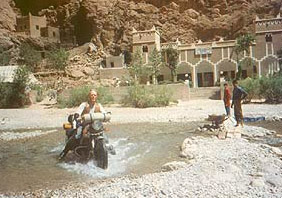
Hotel Restaurant les Roches, Todra Gorge.
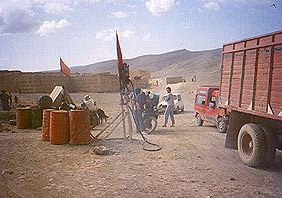
Petrol station offering petrol by the jugful.
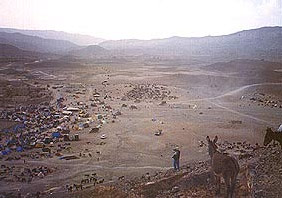
Imilchil Marriage Festival from above.
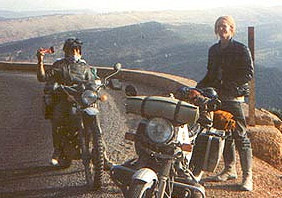
Tizi N'Isly roadside snacking.
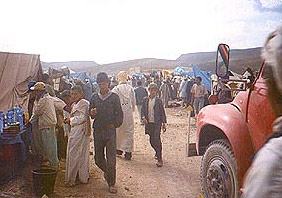
Imilchil Marriage Festival chaos.
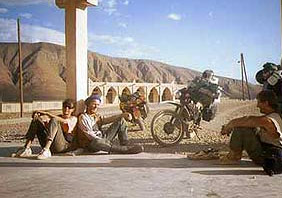
Hot and dusty in the High Atlas.

